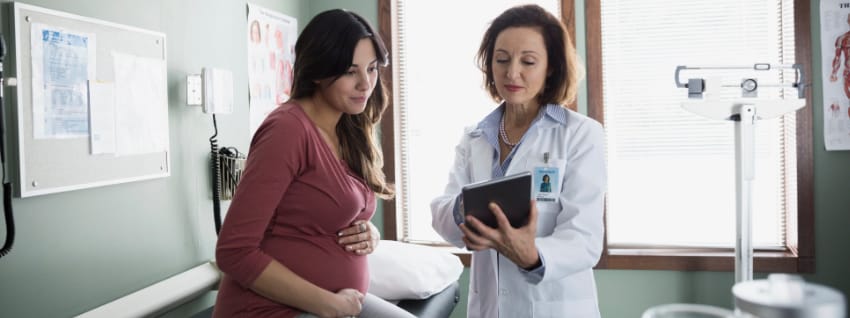Managing Coronavirus (COVID-19) in pregnancy and advice on breastfeeding
Overview
What is Coronavirus?
Coronaviruses (CoV) are a large family of viruses that cause illness ranging from the common cold to more severe diseases such as Middle East Respiratory Syndrome (MERS-CoV) and Severe Acute Respiratory Syndrome (SARS-CoV)1. Novel coronavirus (COVID-19) is a new strain that has not been identified in humans before the current outbreak1.
Common symptoms of COVID-19 include2:
- Fever
- A new, continuous cough
- Shortness of breath
In more severe cases, infection can cause pneumonia, severe acute respiratory syndrome, and even death. The risk for these severe symptoms appears to increase with age and or underlying medical conditions.3
What is the effect of Coronavirus in pregnancy?
Guidance on COVID -19 infection and pregnancy1 was published by the Royal College of Obstetricians and Gynaecologists (RCOG) and other UK maternity health bodies*. This guidance states that pregnant women do not appear to be more susceptible to infection of COVID -19 than the general population however, changes to the immune system in pregnancy may be associated with more severe symptoms. This is particularly true towards the end of pregnancy.
It is expected the large majority of pregnant women will experience only mild or moderate cold/flu like symptoms. Data is limited but special consideration should be given to pregnant women: from Black, Asian and minority ethnic (BAME) background; overweight (BMI 25-29kg/m2) or obese (BMI 30kg/m2 or more); with pre-pregnancy co-morbidities; maternal age or 35 years or older and those living in areas of increased socioeconomic deprivation.
What evidence is there for transmission of COVID-19 in pregnancy?
Findings from a small group of cases suggest that there is currently no evidence for intrauterine infection caused by vertical transmission in women with COVID-19 pneumonia in late pregnancy4. In any case, pregnant women should continue to follow appropriate precautions to protect themselves from exposure to the virus and seek medical care early, if experiencing symptoms1.
Breastfeeding and COVID-19
Considering the benefits of breastfeeding and the insignificant role of breastmilk in the transmission of other respiratory viruses, breastfeeding should be continued1,2. However, precautions should be taken, as there is a risk of transmission from mother to infant through respiratory droplets and direct contact, as well as through contaminated surfaces.
The following RCPCH precautions should be taken to limit viral spread to the baby:
- Consider asking someone who is well to feed the baby.
- Wash hands before touching the baby, breast pump or bottles.
- Avoid coughing or sneezing on the baby while feeding.
- Consider wearing a face covering or fluid-resistant face mask while feeding or caring for the baby.
- Babies should not wear masks or other face coverings as they may risk suffocation.5
Breastfeeding mothers in affected and at-risk areas experiencing symptoms should also seek medical care early.
The RCOG have also published FAQs for pregnant women and their families, which may help you when dealing with further questions from parents:
The evidence for COVID-19 is continuously changing, please check the NHS and RCOG page for the most up to date information.
Other useful links:
- WHO Q&A on coronaviruses (COVID-19)
- UNICEF - Coronavirus disease (COVID-19): What parents should know
- Elsevier’s free health and medical research on novel coronavirus (COVID-19)
- The Lancet COVID-19 Resource Centre
- Health Service Executive Ireland
*Royal College of Midwives, Royal College of Paediatrics and Child Health, Public Health England and Health Protection Scotland.
-
RCOG 2020. Coronavirus (COVID-19) Infection in Pregnancy. Version 12: Published Wednesday 14 October 2020
-
Rasmussen S, Smulian J, Lednicky J, et al. Coronavirus Disease 2019 (COVID-19) and Pregnancy: What obstetricians need to know. American Journal of Obstetrics and Gynecology 2020 doi: https://doi.org/10.1016/j.ajog.2020.02.017
-
Royal College of Paediatrics and Child Health. COVID-19 - guidance for paediatric services 2020. Available at: https://www.rcpch.ac.uk/resources/covid-19-guidance-paediatric-services. (Accessed November 2020)

